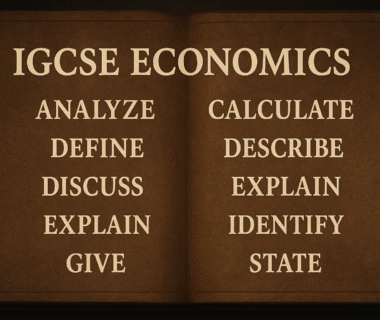Hello, sepupus?
Do you like doing well on exams? Does that er, maximize your utility?
Well, listen up.
Mark schemes are crucial for getting those sweet, sweet, beautiful marks in your Economics (or pretty much any other) exams, whether IGCSE, A Levels, IB, or pretty much anything else — If you’re wondering why I specifically said good at economics exams, just ask yourself: Does being good at economics exams immediately or directly mean that you are good at thinking as an economist? That’s an interesting question, but what’s for sure is this:
If you cannot do well in economics exams, it is very unlikely that somehow or another you are secretly a truly incredible economist. And with that in mind, exams as tests are crucial and it is entirely possible to get higher marks if we understand how those marks are given out.
Here is where mark schemes come in, not just for examiners, but for students who want to excel.
Here’s why!
🎯 1. They Reveal the Target
Mark schemes tell you exactly what the examiner is looking for. Economics is not just about writing something that’s “kind of correct.” It’s about hitting specific keywords, concepts, and logical chains that the examiner has been told to reward.
For example, if the question is:
Explain two reasons why a firm may benefit from economies of scale.
The mark scheme might expect:
- One valid type of economy of scale (e.g. purchasing, managerial)
- A clear explanation of how it reduces average cost
Vague answers like “the firm grows” don’t get marks—even if they’re sort of true; each exam has specific criteria and conditions under which marks can be procured. And if you don’t try to understand them or actually work with the real marking documents in the first place, there’s a very high chance that you will just end up concluding that exams are unfair. The system was rigged against you and you didn’t have a chance when actually it was your own fault for not seeking out this important resource.
Also, understanding the syllabus and assessment objectives is one thing and it’s nice to have and it’s good to have that understanding, but you also need mark schemes; mark schemes offer you concrete and hard reasons as to why a particular answer is correct and will give you a valuable picture of what is correct for the exam that you happen to be taking.
🧠 2. They Train You to Think Like an Examiner
By reading mark schemes, you begin to internalize the examiner’s mindset. You learn to:
- Structure your responses in logical steps (e.g. define → apply → analyze)
- Avoid waffle
- Anticipate the level of depth required for questions
- Sympathize with examiners and imagine what it would be like if you were actually forced to evaluate other people.
This is especially useful in data-response questions or evaluation-based questions, where many students lose marks by either over-explaining or under-developing points.
A little bit more on this. You should try as a student or a parent to understand how an examiner thinks.
It is very worthwhile to do this.
Consider that an examiner wants to reward you for sharing your knowledge and ask yourself what the examiner needs to know in order to give you credit for your answers – They are not here to harm you or to trip you up immediately. Rather, they are performing a very important role in deciding who should be given credit and how they should determine who are the wheat and who are the chaff within the exam cohort. To separate out clearly who are the best – the ones who are good and the ones who unfortunately do not make the cut.
This logic is not exclusive to examiners. If you were to think about it long enough, you might see that there is a societal need for this kind of differentiating behavior, and you might in turn see that at some point, you might have to make the same decisions as well. So, be an examiner for the day, and think about what you would be looking for if you were in their position. It will be valuable for you.
📝 3. They Teach You the Language of Economics
Mark schemes highlight the specific terminology that Cambridge values. Using the correct economic language (e.g. “opportunity cost,” “price elasticity of demand,” “allocation of resources”) can make the difference between a 5 and an 8.
Having examples in front of you will make it very much easier for you to get used to using that language across all future situations, and make it so you don’t just start waffling out things that people won’t understand. It’s not about infinite creativity across a span of things that are ultimately not relevant. Rather, it is about being able to use the language in the common world that you are studying and being able to make use of it in the most effective, well-reasoned ways. Language is not merely about sounding pretty. It is also about being effective. And the mark schemes tell you very clearly what is effective, even if you may have to interpret them and may need good examples (hint: Join Premium!).
🧩 4. They Help You Understand Assessment Objectives
Each question in Economics (IGCSE and A Levels) is mapped to certain Assessment Objectives (AOs) like:
- AO1: Knowledge and understanding
- AO2: Application and analysis
- AO3: Evaluation
Mark schemes show how each of these is rewarded. So if a question is AO3-heavy, you must evaluate—e.g. by weighing alternatives, recognizing limitations, or giving reasoned judgments. Understanding how the assessment objectives work in conjunction with what the mark schemes offer is highly helpful, especially when you have a good teacher or tutor on hand who is able to help you identify the deeper patterns that lie within.
The same is true for the International Baccalaureate as well, which in turn has its own dynamics – for example, knowledge and understanding of economic theories, application analysis, synthesis, and evaluation in Papers 1 and 2, and accuracy of calculations in Paper 3; almost every IB student also probably has nightmares about the rubrics for the extended essay and also for the commentaries that they have to produce as part of a portfolio throughout their entire career.
The IB has its own ways of assessing what is a good IB economics essay, and we’ll talk more about that soon even as I begin to provide and articulate examples that will come out in this website.
But the basic point is this: it doesn’t matter what curriculum it is – you need to find out how you will be marked in order to understand the broader goals of what you’re being taught to do, and you need not just to have that broad overview of the picture or the direction in which things are going but also need a very clear understanding of how things are evaluated on the more granular levels, whatever exam you are taking.
📊 5. They Are a Study Tool in Themselves
Mark schemes let you reverse-engineer good answers. When practicing past papers, you can:
- Compare your answer to the mark scheme
- Spot missing points or overcomplicated explanations
- Learn what earns marks and what doesn’t
It’s one of the most efficient ways to improve.
The reason for this is that you want to make sure that you are hitting the right notes, and the mark scheme is basically a source of truth for you. The more you compare your answers to mark schemes and the more you become able to produce answers that hit the correct note, the higher the marks you will get in your exams as compared to what you would have gotten if you had not seen the mark schemes in the first place.
✅ Summary
Mark schemes aren’t just tools for checking your score—they’re guides for mastering the exam. If past papers are the questions, mark schemes are the answer key to success. Learn their logic, adopt their style, and you’ll write answers that the examiner wants to reward.
They are your keys to the kingdom of economics heaven. Or if you are not religious, then to the mansion. The luxury car or to the dream holiday destination where you can meditate beyond the confines and constraints of banal human life into the higher reaches of a more beautiful universe.
Take your mark schemes friends and use them as a part of your strategy. Don’t listen to me tell you this over and over again. Reading what I say and hearing me tell you things is only going to get you so far. You can have all the premium resources that you want, but you must use them. You must be proactive, and you must take your learning into your own hands. It is an honor to be a part of your journey, but you are far from done. Go further and farther, and if you want to thank me, do it after you succeed.
I look forward to hearing your stories!




